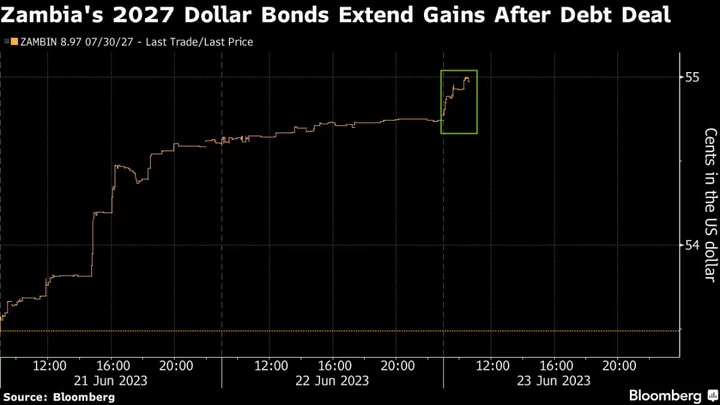Bonds of developing nations in debt distress gained on Friday in a broad relief rally sparked by Zambia’s precedent-setting deal with bilateral creditors.
The southern African country reached an agreement in principle to restructure $6.3 billion of debt, potentially unlocking funding from the International Monetary Fund and setting the stage for a renegotiation of its Eurobonds as well.
The deal marks the first major relief won by a developing country under the Group of 20 nations’ Common Framework that brings the traditional creditors in the Paris Club around the same negotiating table with China. That could lead the way for other countries — including Ghana, Sri Lanka and Ethiopia — which are in talks with lenders. More than 70 low-income nations face a collective $326 billion burden, with more than half of them already in or near debt distress, according to the IMF.
“It’s a first and very important step and importantly, it seems that Chinese creditors have agreed to the terms,” said Philip Fielding, co-head of emerging markets at Mackay Shields UK. “Getting a distressed curve restructured should help other distressed curves.”
Zambia’s 2027 dollar securities extended gains on Friday, rising about half a cent to 54.44 cents on the dollar, according to CBBT pricing. Ghana’s 2030 notes added 0.6 cent to 65.62, while bonds of Sri Lanka and Pakistan also advanced in Asian trading.
Details of the agreement remain unclear, beyond the fact that the creditors led by China and France agreed to extend the maturities on their loans over some 20 years, with a three-year grace period, according to a French official, who announced the deal on Thursday. It also requires comparable treatment of Zambia’s commercial debt.
Significant Milestone
The parties are expected in coming weeks to sign a memorandum of understanding for the debt treatment that Zambia’s finance ministry said included “significant maturity extensions and reduction in interest rates.”
The pact is a “significant milestone” for the Common Framework, IMF Managing Director Kristalina Georgieva said in a statement. While creditors agreed “deep debt relief for Zambia,” the pact includes a “contingent treatment” that would be triggered if Zambia’s economic performance improves, she said, without providing more detail.
That flexibility could also be applied to other struggling nations, said Kaan Nazli, a senior economist and portfolio manager at Neuberger Berman Asset Management.
“One of the most important features of the agreement is that debt repayments may accelerate and interest payments may be adjusted if the country is upgraded to medium debt carrying capacity,” Nazli said. “This will provide more momentum to the private creditor talks as well, also to the ongoing talks with Sri Lanka and Ghana.”
Pushback
Still, until the details become clearer — especially about China’s involvement — some investors will remain wary. While the Zambian deal provides a template, negotiations in other countries may still take months to nail down and bondholders would want to ensure they receive fair treatment.
The Common Framework was both intended as an “on-ramp” for Chinese creditors to participate in multilateral debt-relief efforts, but could also become “an opportunity for China to rewrite some pages of the rulebook,” said Connor Vasey, an analyst at Eurasia Group. “The devil is in the detail, and any indication that concessions made to Chinese lenders will increase the burden on bondholders, then pushback is likely.”
The memorandum isn’t legally binding and Zambia still must sign bilateral agreements with each creditor. It has also yet to conclude restructuring talks with holders of $3 billion in Eurobonds, which had accrued more than $500 million in arrears by the end of last year. Other commercial creditors are likewise yet to strike a deal.
Zambia in October said it was seeking to revamp $12.8 billion in external debt, and it’s unclear if this amount has changed following negotiations in which China called for more relief from lenders such as the World Bank, and for some of its own debts to be excluded. Zambia owed about $6 billion to Chinese lenders, around one-third of its total foreign liabilities.
Given the price appreciation already seen in Zambia’s defaulted bonds, “some investors may turn cautious until there is more clarity on the terms of commercial debt restructuring,” said Samir Gadio, head of Africa strategy at Standard Chartered Bank Plc. “Other distressed or defaulted names trading at lower cash prices may have more room to gain if the outlook for debt restructuring with official creditors improves.”
--With assistance from Matthew Hill, Ania Nussbaum and Taonga Mitimingi.
(Updates prices in fifth pragraph, adds analyst comment in 12th paragraph)

